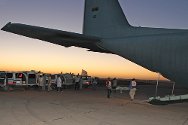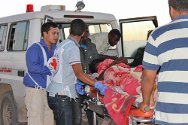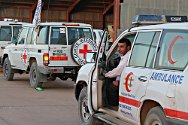Libya: urgent aid to displaced and wounded people
21-06-2012 Operational Update
Following clashes in the Nefusa Mountains and Al Kufra, the ICRC is providing much-needed aid. It is also continuing to remove explosive remnants of war and to conduct visits to detainees, while pressing ahead with efforts to account for missing persons.
People displaced in the Nefusa Mountains
Clashes over the past few days in Sgeiga and Misdah, in the Jebel Nefusa south-west of Tripoli, have forced thousands of people to flee their homes in search of safety.
"About 600 displaced people are currently in two schoolhouses in Sgeiga," said Alexander Griff, an ICRC delegate. On 20 June, the ICRC and the Libyan Red Crescent delivered mattresses, kitchen sets, buckets and hygiene items to the people sheltering there.
Earlier this week, the ICRC donated enough surgical supplies to treat 50 weapon-wounded patients, as well as body bags, to the main hospital in the area, in Gharyan.
"Primary health-care units around Sgeiga are administering first aid to injured people," said Mr Griff. "In support of the local authorities, we have supplied these units with medical items, including wound-dressing materials. Our colleagues from the Libyan Red Crescent have set up two health posts in the area as well."
Fighting continues in Misdah. The area has been declared a military zone by the authorities.
Evacuation of wounded people in Al Kufra
In Al Kufra, in the south-east of the country, recent fighting resulted in casualties. During the night from 16 to 17 June, at the request of the Libyan authorities, the ICRC evacuated 62 wounded patients and 38 persons accompanying them.
"We provided safe passage for Tabu patients to the airport of Kufra, as ICRC staff were the only ones allowed to enter the Tabu area," explained Detta Gleeson, an ICRC health delegate. "The evacuation was coordinated closely with the Ministry of Health, which made two planes available to fly these people out to various hospitals in Tripoli."
In Al Kufra, the ICRC also:
- organized the handover of five dead bodies to their families;
- provided the clinics in the Tabu area with supplies made available by the health authorities, including dressing materials, fluids, drugs and oxygen, which were needed for the emergency treatment of wounded people;
- donated body bags, stretchers and first-aid supplies to the hospitals in Al Kufra and the local ambulance centre, which evacuated large numbers of wounded Zwai people and which provided the ambulances for the ICRC's evacuation of patients.
Furthermore, the ICRC provided safe passage for engineers from the General Electrical Company of Libya so that work could go ahead in order to boost the electricity supply for people in several neighbourhoods of Al Kufra town.
Tripoli suburban farmland cleared of unexploded ordnance
Over the past two weeks, the ICRC has been clearing explosive remnants of war in Kasr Bin Ghashir, a suburban area of Tripoli highly contaminated by devices that continued to pose a threat to the population. Almost 250 explosive items have been destroyed so far, and another 112 have been located and marked for demolition in the coming days. The ICRC is coordinating these activities with the Libyan Mine Action Center and the Military Council. Clearance is essential to enable the local population to use the land for farming.
Meanwhile, ICRC-trained volunteers from 18 Libyan Red Crescent branches continue to raise awareness among the Libyan population of the threat posed by unexploded ordnance and to collect casualty data.
Improving conditions of detention
Between January and May, the ICRC visited over 9,200 people held in 66 different places of detention in Libya. An ICRC doctor took part in 30 of the 128 visits conducted during this period. ICRC visits to detainees are continuing throughout the country. The ICRC maintains a confidential dialogue with the authorities at all levels on issues such as the treatment of detainees, respect for legal safeguards and the professional management of detention places.
At the beginning of June, the ICRC took action to improve hygiene conditions in two centres accommodating approximately 2,500 migrants. It delivered supplies essential for the maintenance of sanitation blocks to a centre in Gharyan, where it also installed two water bladders. At a centre in Benghazi, it distributed disinfectants, soap and other cleaning products.
Supporting the authorities in their efforts to account for missing persons
The ICRC continues to support the efforts of the Ministry for the Affairs of Families of Martyrs and of Missing Persons to determine what happened to people who went missing during the conflict. It provides advice and operational support for the recovery and identification of human remains.
In June, the ICRC was invited to explain complex forensic procedures to the Ministry's staff, based in Ajdabiya, Tripoli and Benghazi, who will be working on burial sites. It is important to ensure that evidence that could help provide answers to the families of missing persons is not lost.
For further information, please contact:
Soaade Messoudi, ICRC Tripoli, tel: +218 913 066 198
Soumaya Beltifa (in Arabic), ICRC Benghazi, tel: +218 923 304 560
Steven Anderson, ICRC Geneva, tel: +41 22 730 20 11 or +41 79 536 92 50



